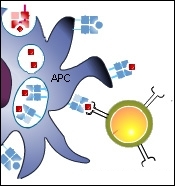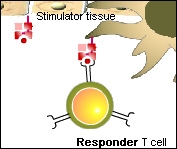Indirect / direct recognition of histoincompatible antigens by T cells
Indirect recognition of major histocompatibility antigensAlthough major histocompatibility molecules are themselves the molecules that present peptides to T cells, a mismatched major histocompatibility molecule can also be internalized, processed and presented by the major histocompatibility molecules of the responder APC. This process known as indirect recognition is not significantly different from how the immune system would recognize a normal antigen. As for most exogenous antigens, allogeneic MHC molecules will be predominantly shunted through the MHC class II antigen presentation pathway and therefore only be able to prime CD4+ T cells. However, some peptides derived from internalized proteins may end up being presented by class I molecules through cross-presentation. Hence, CD4+ as well as CD8+ T cells may recognize allogeneic MHC molecules through the indirect pathway. Histoincompatible antigens may be recognized through the direct as well as through the indirect pathway during the priming phase as well as during the effector phase. As a consequence, effector cells may recognize (processed) alloantigens in a self-restricted fashion or recognize mismatched MHC molecules directly.
Direct recognition of major histocompatibility antigensT cells may also recognize an allogeneic MHC-molecule directly on the stimulator APC. This pathway referred to as direct recognition is usually many times more vigorous than the indirect recognition. The percentage of T cells responding to allogeneic MHC-molecules is considerably higher than against a common antigen. In fact, between 0.1% and 10% of the T cells in a individual (compared with < 0.001% for a microbial antigen) may directly recognize a mismatched MHC molecule on an allogeneic cell. This can be explained by the fact that although the alloreactive T cells have been selected positively in the thymus of the responder and are therefore self-restricted, the ternary structure of the complex formed by the allogeneic MHC-molecule and the peptide it presents may resemble a self-MHC molecule presenting a viral peptide closely enough to be recognized by cross-reaction. Recognition of minor histocompatibility antigensMinor histocompatibility antigens represent another group of alloantigens that may be recognized after transplantation. Basically, they are peptides recognized by self restricted T cells that are processed from the stimulator's proteins and when the donor and recipient express different alleles, the peptide from the processed self-protein will be unknown and the responder will react in the same way as it will react to an unknown peptide derived from a pathogen. Read more about minor histocompatibility antigens ? |
|
|
Transplantation Immunology | |||||||||||||||||||
|
||||||||||||||||||||




 Print
Print